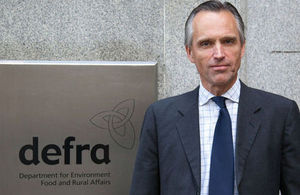The Illegal Wildlife Trade Ends Here
Illegal wildlife trade threatens entire species and is a global problem in need of a global solution

UK Minister for Natural Environment, Lord de Mauley
Today in Kasane, Botswana, political representatives from around the world will meet to agree urgent action to tackle the illegal wildlife trade.
The illegal killing and trading of endangered wildlife for profit is abhorrent. The poachers and traffickers who conduct these dreadful crimes must be stopped. Organised criminal networks are stealing resources from communities that depend on them, preventing them being used to secure a sustainable future.
The illegal wildlife trade drives corruption, devastates communities, undermines efforts to cut poverty and threatens the existence of some of the world’s most iconic and treasured species. There is anecdotal evidence that it is being exploited by terrorist organisations. The illegal wildlife trade must end now.
I believe that the international community can achieve this. In February 2014 the UK hosted a high-level international Illegal Wildlife Trade conference in London.
We agreed the need for urgent and decisive action, and signed up to an ambitious Declaration to reduce demand, strengthen enforcement and support sustainable livelihoods for communities affected by illegal wildlife trade. We committed to supporting a commercial ban on international trade in elephant ivory; to renounce the use of any products from species threatened with extinction; and to treat poaching and trafficking as serious organised crime in the same category as drugs, arms and people trafficking.
Since the London Conference, Chad, Belgium, Hong Kong and China among other countries have destroyed stockpiles of seized illegally traded wildlife products. Kenya is the most recent country to have done the same. New programmes of work are underway in destination states to reduce consumer demand for illegal wildlife trade products, and countries around the world are strengthening their legal frameworks against the trade.
All of this work is commendable, and vital. But there is more to do.
Wildlife crime has reached unprecedented levels. In January South Africa reported that rhino poaching is on the increase. Thousands of elephants are still being killed across Africa. The illegal wildlife trade is still an urgent global issue.
The UK has committed to continuing to play its part in wiping out the trade.
We are managing a £10 million package over four years to help reduce demand, strengthen enforcement and support sustainable livelihoods. Around £5.3 million (equivalent to Ksh 725 million) has been allocated through our ‘Illegal Wildlife Trade Challenge Fund’ to 19 projects in developing countries around the world. We have committed our financial support to the Governments of Botswana, Chad, Ethiopia, Gabon and Tanzania in implementing the ground-breaking Elephant Protection Initiative. In Kenya, through the Department for International Development (DFID) we are supporting a UN led project to tackle the illegal wildlife trade, and have funded training to support implementation of the Wildlife Act.
I’d like to applaud the Government of Kenya for its recent efforts. The Wildlife Act was an important step, and the stockpile destruction on 3rd March a pivotal moment. The stakeholder Conference held in Naivasha demonstrated the commitment of Government and NGOs here to work together to eradicate poaching and protect Kenya’s wildlife. I urge the Government of Kenya to continue this leadership.
The Kasane Conference is an opportunity to maintain the high level of political commitment we saw in London a year ago. It is an opportunity to continue the war against this illicit trade, and I am delighted to be leading the UK delegation.
I want to see stronger action by Governments to reduce demand for illegal wildlife trade products and a clamp down on financial crimes associated with IWT. I also want to see local people have appropriate rights over wildlife resources, so they are able to benefit from them, and be full partners in efforts to tackle the illegal trade.
We must act now. If we wait any longer, we consign ourselves to a world in which all the endangered species living in the wild have been killed. We must send a powerful message to poachers and traffickers wherever they operate: the illegal wildlife trade ends here.